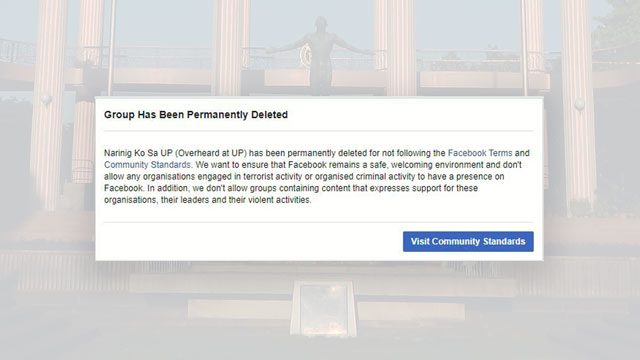SUMMARY
This is AI generated summarization, which may have errors. For context, always refer to the full article.

MANILA, Philippines (UPDATED) – For the University of the Philippines (UP) community, Facebook’s takedown of the decade-old group ‘Narinig ko sa UP’ (Overheard at UP) was the end of an era.
On Sunday, December 1, Christian Rillera shared in a Facebook post that ‘Narinig ko sa UP’ was taken down by the social media giant over alleged violation of community standards.
Rillera, who created the group in 2009, said that he and other group moderators were logged out of their accounts and received the notice from Facebook.
Rillera told Rappler that he was puzzled about the incident because Facebook didn’t specify what the group violated.
“I found the takedown notice quite vague because it mentioned a specific part of their community standards on terrorism and criminal activity,” Rillera said.
According to its community standards, Facebook does not allow any organizations and individuals that “proclaim a violent mission or are engaged in violence” on their platform. These include: terrorist activity, organized hate, mass murder (including attempts) or multiple murder, human trafficking, and organized violence or criminal activity.
The Facebook community standards also state that they remove content with “very high confidence that it contains support for terrorism.”
“We still rely on specialized reviewers to evaluate most posts, and only immediately remove posts when the tool’s confidence level is high enough that its ‘decision’ indicates it will be more accurate than our human reviewers,” Facebook said.
Before the takedown, ‘Narinig ko sa UP’ was a group of more than 200,000 members – including alumni, students, professors, and incoming students of the premier university.
Starting as an online forum where members shared memes, favorite spots on campus, and memorable lines from professors, the group had become a platform for the community to discuss and share their takes on pressing national issues.
“At times, the page looked like a community billboard. But every now and then, activity would pick up – UP student council elections, pressing issues in the country, current events, national elections, and UAAP,” said Rillera.
Why the takedown?
Rillera said that when he created the group in 2009, the goal was just for it to be a place for the UP community to talk about anything campus-related. It started with only 700 members then grew exponentially as Facebook became popular to a younger audience.
However, with the founders’ busy schedule, it became difficult for them to moderate the group, which was why non-UP students and suspected fake accounts and trolls got in.
“The group was public so everyone can see it. Most of the time we just mass approved requests because of its volume. It was honestly difficult and time consuming to check each request one by one,” Rillera admitted.
But according to him, the takedown happened after the group did a series of watch parties about the Philippines’ hosting of the 30th Southeast Asian Games (SEA Games). He suspected that the group was mass reported by trolls and Facebook accounts supportive of President Rodrigo Duterte.
Even before the SEA Games officially started on Saturday, November 30, the event made headlines following the backlash over logistical blunders, insufficient food for delegates, and workers racing to finish the construction of venues.
While most Filipinos online were embarrassed by the SEA Games fiasco, others took a swipe at the Philippine media “over negative reports,” which according to President Rodrigo Duterte’s supporters has put the country in a bad light.
Duterte expressed disappointment over the mishaps and wanted a probe into why these things happened. (READ: Duterte ‘displeased’ by SEA Games mishaps, wants probe)
Next steps
While the notice they received from Facebook was a “permanent” account deletion, Rillera said they are refuting the takedown.
“I sent a query via their webform as to why we were deleted because people will make conclusions,” Rillera told Rappler.
He said that they are keen on creating a new group until Facebook replies to them.
Asked for his message to the social media platform, Rillera said: “How did you go about the decision to delete the group? Is it possible to bring it back intact – with all the posts?”
‘The group is back!’
After more than 24 hours, Facebook reactivated the “Narinig ko sa UP” group on Monday night, December 2.
According to Rillera, they were ecstatic over this development, although they still wanted toknow hwy the group was suspended.
“Facebook has not said anything yet about why it was deleted in the first place. Just so we know what we need to do in the future,” Rillera said.
To avoid any similar incident, Rillera said they will be stricter in approving membership requests.
“I think we are going to be more stringent when it comes to approving new members. Still not sure how to do it, but that’s the first thing we need to improve,” Rillera added. – Rappler.com
Add a comment
How does this make you feel?
There are no comments yet. Add your comment to start the conversation.